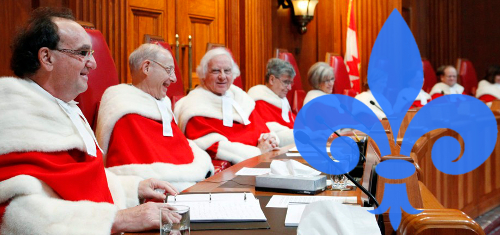 Canada’s Supreme Court has handed down a telecommunications ruling that throws further doubt on Quebec’s plans to block the domains of online gambling sites the province doesn’t like.
Canada’s Supreme Court has handed down a telecommunications ruling that throws further doubt on Quebec’s plans to block the domains of online gambling sites the province doesn’t like.
On Thursday, the Court unanimously ruled that a Quebec municipality couldn’t block telecom provider Rogers Communications from installing a new cell tower at a particular address.
Rogers had sought and received permission from a federal department to put a cell tower on land it was leasing in Châteauguay, a suburb of Montreal. Rogers said the tower was necessary to improve the quality of its local service.
Châteauguay had expressed opposition to Rogers’ plan due to (a) the tower being “visually disagreeable” and (b) alleged fears regarding potential threats the tower posed to local residents’ health and safety. When that gambit failed, the city rezoned the property as a “land reserve” that put the kibosh on Rogers’ plans.
The Court rejected the city’s health claims, saying the objections were based solely on “the choice of the location of radio-communication infrastructure.” As telecom issues have always been considered a federal responsibility, the city’s actions were deemed unconstitutional.
QUEL DOMMAGE
Similar claims of unconstitutionality have been made against the plans by Quebec’s Ministry of Finance to force local internet service providers to IP-block online gambling sites that compete with Espacejeux, the online gambling division of the Loto-Quebec provincial gaming monopoly.
Like Châteauguay, the Ministry of Finance has claimed the blocking is a “health” issue, in that only Loto-Quebec will guard against the potential harms online gambling might pose to local residents. Never mind that the original publicly stated raison d’être was boosting Espacejeux’s annual revenue by $27m.
University of Ottawa law professor Michael Geist, an early critic of Quebec’s IP-blocking plans, told The Globe & Mail that Thursday’s decision suggests that both of Quebec’s stated aims “won’t be enough to stop the law from being struck down once it’s challenged in the courts.”
Another Ottawa lawyer, David Elder, said there was “a good argument” to be made that “broad accessibility is essential to a communications network.” Elder also suggested that Quebec’s plans could fall afoul of Canada’s Charter of Rights and Freedoms for impeding freedom of expression.
Kurt Eby, regulatory affairs director for the Canadian Wireless Telecommunications Assoiation, said his members would be studying the Supreme Court decision to see “whether it has any impact on how the industry might approach” a legal challenge of Quebec’s Bill 74.
